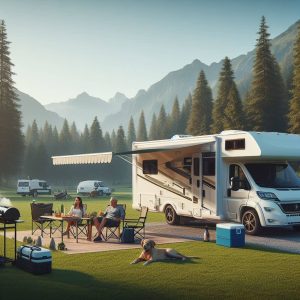
Retirement is a time to relax, unwind and explore new adventures. RV retirement, in particular, offers the freedom to travel while enjoying the comfort of your own home on wheels. Whether you’re looking to spend your golden years exploring national parks, visiting family and friends, or simply living a life of adventure, RV retirement could be the perfect lifestyle change for you.
In this guide, we’ll explore everything you need to know about RV retirement, including planning for a smooth transition, choosing the right RV, finding your community on the road, budgeting for life on the road, and tips for maintaining a healthy and fulfilling lifestyle. Let’s dive in!
Planning for RV Retirement: Tips for a Smooth Transition
If you’re considering RV retirement, it’s important to plan ahead for a smooth transition. Here are some practical tips and advice to help you prepare:
1. Consider Your Finances
With RV retirement, you’ll have some unique financial considerations to keep in mind. You’ll need to budget for the cost of purchasing or renting an RV, as well as ongoing expenses like insurance, maintenance, and campground fees. It’s a good idea to work with a financial advisor to ensure your retirement income is sufficient to support your RV lifestyle.
Set Up a Budget
Once you’ve determined your expenses and downsized your possessions, create a budget to help you manage your finances while on the road. Be sure to account for all your RV-related expenses, including fuel, maintenance, and campground fees, as well as other living expenses like food and entertainment.
Navigating the Costs of RV Retirement: Budgeting for Life on the Road
RV retirement can offer an affordable and flexible lifestyle, but it’s important to understand the necessary costs and budget accordingly.
One of the biggest expenses related to RV retirement is the initial purchase of an RV. Motorhomes typically cost more than towable RVs, and larger models come with a higher price tag. Before making a purchase, it’s important to research different options and determine the best fit for your retirement lifestyle.
Other RV retirement costs include maintenance and repairs. Regular maintenance is crucial to keep the RV running smoothly and prevent breakdowns on the road. This includes oil changes, tire rotations, and general upkeep. RV owners should also budget for unexpected repairs and replacements, such as a broken water pump or damaged awning.
Insurance is another necessary expense for RV retirement. Insurance rates can vary based on several factors, including the type of RV, the driver’s age and driving record, and the coverage options selected. It’s important to shop around and compare quotes from different insurance providers to ensure the best rate.
Campground fees and fuel expenses are additional costs to consider. While staying at a campground can provide access to amenities and a sense of community, fees can add up quickly. Fuel expenses also vary depending on the type of RV and how often it’s driven. RVers should consider their travel plans and budget accordingly.
To manage RV retirement costs, creating a detailed budget is essential. It’s important to factor in all necessary expenses, including fixed costs like insurance and variable costs like fuel and campground fees. RVers should also consider setting aside an emergency fund for unexpected repairs or medical expenses.
To keep your fuel costs down, read my post about maximizing your RV’s fuel mileage and consider investing in the Roadtrippers app, which gives you discounts on the price of fuel. To learn more, click here, and to get $5 off your joining fee, use my special code: BTR5QTP
By properly planning and budgeting for RV retirement costs, retirees can enjoy the freedom and flexibility of the open road without breaking the bank.
Your Costs Calculator
Input your approximate costings into each column and allow the calculator to tell you roughly how much you are going to be spending each month. When you press ‘Calculate’ the calculator will also give you your approximate costings over the whole year.
RV Retirement Budget Calculator
Approximate Yearly Expenses:
Downsize and Declutter
One of the biggest challenges of RV retirement is downsizing your possessions to fit into your new living space. Take time to declutter your home and sort through your belongings, deciding what you’ll keep, sell, or donate. Consider investing in space-saving organizational tools to maximize storage space in your RV.

Create a Routine
While RV retirement offers freedom and flexibility, it’s important to establish a routine to ensure you stay organized and on track. Set a regular schedule for cleaning and maintenance tasks, as well as time for exercise, hobbies, and socializing.
8. Keep Learning
RV retirement is an adventure, and there’s always something new to learn. Take advantage of educational opportunities and resources, such as RVing blogs, forums, and classes, to stay up-to-date on industry news and helpful tips.
With these tips, you can plan for a successful RV retirement and enjoy the freedom and adventure of life on the road.
Choosing the Right RV: Finding Your Perfect Home on Wheels
Full-time RV living is a lifestyle choice that requires careful consideration and planning. One of the most important decisions that RV retirees need to make is choosing the right RV. The ideal RV can provide a comfortable and convenient home on wheels, making the retirement lifestyle enjoyable and stress-free.
Types of RVs
There are several types of RVs suitable for full-time living, each with its own unique features and benefits:
- Motorhomes: These RVs are built on a truck or bus chassis and come in three classes: A, B, and C. Class A motorhomes are the largest and most luxurious, while Class B motorhomes are smaller and more compact. Class C motorhomes are mid-sized and offer a compromise between size and luxury.
- Travel Trailers: These RVs are towed behind a truck or SUV and come in various sizes and styles. They offer a home on wheels that can be detached from the vehicle, making it easy to explore the surrounding area without the need to take the entire RV.
- Fifth Wheels: These RVs are towed by a pickup truck with a special hitch and offer a spacious and comfortable living area. They provide more living space than travel trailers and are often preferred by retirees who want to spend extended periods on the road.
Choosing the Right RV for Your Retirement Lifestyle
When choosing the right RV for your retirement lifestyle, it is important to consider your specific needs and preferences. Factors to consider include the size of the RV, the number of people traveling, and the amount of time you plan to spend on the road. Other factors to consider include:
- Comfort: Look for an RV that offers comfortable living quarters, including a comfortable bed, ample storage, and a functional kitchen and bathroom.
- Mobility: Consider the maneuverability of the RV, especially if you plan to travel to remote areas or park in tight spaces.
- Cost: Factor in the cost of purchasing and maintaining the RV, as well as fuel costs and campground fees.
Tip: Take your time when choosing an RV and do your research to ensure that you find a model that fits your lifestyle and budget.
Exploring RV Retirement Communities: Finding Your Community on the Road

One of the most significant benefits of RV retirement is the opportunity to join a community of like-minded individuals on the road. RV retirement communities provide a sense of camaraderie, social opportunities, and support that can make the transition to this lifestyle more manageable.
There are many different types of RV retirement communities available, from private parks to state-run campgrounds. Some are designed specifically for retirees, while others cater to families and individuals of all ages. Regardless of the type of community, all offer a range of amenities and social activities for residents.
Benefits of RV Retirement Communities
Joining an RV retirement community offers a range of benefits, including:
- Access to social activities and events
- A sense of community and camaraderie
- Safety and security, with many communities featuring gated entrances and 24-hour security
- Support and assistance from other members of the community
- Opportunities for volunteering and giving back to the community
“Joining an RV retirement community offers a range of benefits, including a sense of community and camaraderie.”
Many RV retirement communities also offer amenities such as swimming pools, fitness centres, and recreational facilities. Some even have on-site restaurants, convenience stores, and medical facilities.
Attending events or rallies hosted by RV retirement communities is a great way to get a feel for the community and connect with other members.
To find the best RV communities across the U.S. for RV retirees you could read this blog post:

Mapping Your RV Retirement Destinations: Exploring the Open Road
One of the biggest perks of RV retirement is having the freedom to explore new destinations and embark on exciting adventures. But with so many options, it can be overwhelming to plan your travels. Here are some tips for choosing the best RV retirement destinations:
Consider Your Interests
Think about the activities and experiences that most appeal to you. Do you love hiking and outdoor adventures? Or are you more interested in visiting museums and cultural landmarks? Consider your passions and plan your travels accordingly. This will help you make the most of your RV retirement lifestyle.
Research Campgrounds
When selecting an RV retirement destination, it’s important to research campgrounds in the area. Look for RV parks that offer the amenities you need, such as hookups, laundry facilities, and Wi-Fi. Check out online reviews from other RVers to get an idea of what to expect.
Trip Wizard App
I would seriously recommend this app to help you plan your retirement RV trips. When you explore the Trip Wizard website, you’ll see it has the following features:
- over 20, 000 campgrounds
- over 57, 000 points of interest
- web-based, so no installation
- customised to your RV
- understands the cost of your trip
- finds the best value parks
- sets driving times and distances
- visual RV trip planner
- unbiased information.
For your free 7-day trial, click here
Create an Itinerary
Mapping out an itinerary can help you make the most of your RV retirement travels. Consider the distance between destinations and plan for rest days to avoid burning out. Be sure to leave room for spontaneity and unexpected detours. RV retirement is all about exploring and enjoying the journey!
RV Retirement Safety: Tips for a Secure Journey
When you’re on the road in your RV retirement, safety should always be a top priority. Whether you’re driving, parked at a campground, or exploring a new destination, taking the proper precautions can help ensure a secure journey. Here are a few tips to help you stay safe:
Driving Safety
Before hitting the road, make sure your RV is in good working order. Check the brakes, tires, and lights to ensure they’re functioning correctly. Follow all traffic laws and stay within the speed limit. When driving in inclement weather, slow down and take extra precautions.
Securing the RV
When parked at a campground or RV park, it’s essential to secure your RV to prevent theft. Invest in quality locks and use them to secure all doors and windows. Consider installing an alarm system for added security. If you’re leaving the RV unattended for an extended period, remove any valuables and lock them away. You could invest in a small portable safe.
Personal Safety
While RV retirement can be a safe and enjoyable experience, it’s important to be aware of your surroundings and take precautions to protect yourself. When meeting new people, exercise caution and trust your instincts. Keep your RV doors locked at all times and consider investing in a security camera system for additional protection.
Emergency Preparedness
When traveling in your RV retirement, it’s important to be prepared for emergencies. Keep a first aid kit and fire extinguisher on board and ensure they’re easily accessible. Familiarize yourself with the location of emergency services in each destination you visit. Consider investing in a generator or solar panels to ensure you have power in case of an outage.
By following these tips for RV retirement safety, you can enjoy your journey with peace of mind. Remember, safety should always be a top priority, whether you’re a seasoned RVer or just starting your adventure.
Maintaining a Healthy Lifestyle on the Road: Wellness Tips for RV Retirement
Living on the road can be an exciting and rewarding experience. However, it’s important to prioritize your health and well-being while embracing the RV retirement lifestyle. Here are some tips for staying healthy and active on the road:
Stay Active
Traveling in an RV doesn’t have to mean giving up your daily exercise routine. There are plenty of ways to stay active on the road, from taking a morning jog around the campground to going on a hike in a nearby state park. Many RV parks and resorts also offer fitness centers and workout classes, so take advantage of those opportunities as well.
Eat Well
While on the road, it can be tempting to rely on fast food and convenience store snacks. However, it’s important to maintain a healthy diet to feel your best. Try to cook your own meals as much as possible, using fresh ingredients and whole foods. Stock up on healthy snacks like fruits, nuts, and veggies to keep you fueled throughout the day.
Access Healthcare
One of the challenges of RV retirement is finding healthcare providers while on the road. Be sure to research medical facilities and providers in advance, so you know where to go in case of an emergency. Consider joining a nationwide healthcare network that provides coverage in multiple states.
Prioritize Self-Care
Living in a small space can be stressful at times, so it’s important to prioritize self-care. Take some time each day to relax and unwind, whether that means reading a book, meditating, or taking a long bath. Treat yourself to a spa day or a massage when you have the chance. Remember, taking care of yourself is just as important as taking care of your RV.
Final Thoughts
Maintaining a healthy lifestyle is crucial to enjoying the RV retirement lifestyle to the fullest. By staying active, eating well, accessing healthcare, and prioritizing self-care, you’ll be able to fully embrace this exciting new chapter in your life.
Embracing RV Retirement with Pets: Tips for Traveling with Furry Companions

For many retirees, their furry companions are more than just pets – they’re family members. And just because you’ve decided to embrace the RV retirement lifestyle doesn’t mean you have to leave your four-legged friends behind. With some planning and preparation, traveling with pets can be a fun and rewarding experience. Here are some tips to help make the journey as smooth as possible:
Choose Pet-Friendly RV Parks
When planning your travel itinerary, make sure to research pet-friendly RV parks along the way. Many parks have pet policies and restrictions, so it’s important to know what to expect before you arrive. Look for parks that offer amenities such as dog runs, pet-washing stations, and waste disposal facilities.
Keep Pet Routines Consistent
Just like humans, pets thrive on routine. Whether it’s mealtime, potty breaks, or playtime, it’s important to maintain a consistent schedule for your furry friends. This will help them adjust to life on the road and reduce stress. Make sure to pack plenty of food, treats, and toys to keep your pets happy and entertained.
Ensure Pet Safety
When traveling with pets, it’s crucial to ensure their safety at all times. Make sure your pets have proper identification, including collars with tags and microchips, in case they become separated from you. You may also want to consider investing in a pet seatbelt or carrier to keep your pets secure while driving. Finally, be aware of potential hazards at your RV site, such as poisonous plants or steep drop-offs.
Take Care of Pet Health
Just like humans, pets need access to healthcare while on the road. Make sure to bring along your pet’s medical records, including vaccination records and any necessary medications. Research veterinary clinics near your RV park in case of emergency. Finally, make sure to give your pets plenty of exercise and opportunities to stretch their legs.
Enjoy the Journey with Your Furry Companions
Traveling with pets can be a rewarding experience for both you and your furry friends. It’s a great opportunity to bond and create memories together. So don’t be afraid to embrace RV retirement with your pets – with some planning and preparation, it can be a fun and fulfilling experience for all.
3. Stay in Touch with Family and Friends
Just because you’re living on the road doesn’t mean you have to lose touch with loved ones. Thanks to modern technology, it’s never been easier to stay connected with family and friends, no matter where you are. Take advantage of video calling, social media, and messaging apps to stay in touch, share updates, and maintain relationships.
4. Volunteer and Give Back
Volunteering is a great way to give back to the community while also meeting new people and forming connections. Many RV parks and retirement communities have opportunities for residents to volunteer, whether it’s helping out with park events, assisting with local charities, or participating in community service projects. Not only will you feel good about giving back, but you’ll also be able to connect with others who share your values and interests.
Conclusion
As this guide comes to a close, we hope you’ve gained a better understanding of what RV retirement can offer. By embracing this lifestyle, you’ll have the freedom and flexibility to explore new destinations, meet like-minded individuals, and build unforgettable memories.
Remember, planning is key to a successful transition to RV retirement. Take the time to prepare, whether it’s downsizing your possessions, creating a budget, or choosing the right RV for your needs. Joining an RV retirement community can also provide a sense of community, support, and fun activities.
As you hit the open road, make safety a priority by taking precautions while driving and securing your RV. It’s also important to prioritize your health and wellness, whether it’s staying active, eating well, or seeking medical care when needed.
Don’t forget about your furry friends! RV retirement can be an exciting adventure for them too, as long as you keep their needs in mind, including pet-friendly campgrounds and routines.
Finally, RV retirement is a social lifestyle. Connect with fellow RVers, participate in group activities, and stay in touch with loved ones. I hope this guide has provided useful insights and inspiration as you embark on your RV retirement journey. Happy travels!
Affiliate disclosure: My article contains affiliate links which will result in my making a small commission if you click on them and make a purchase. This will be at no extra cost to you but will help to fund my expensive coffee habit, for which I will be forever grateful.

